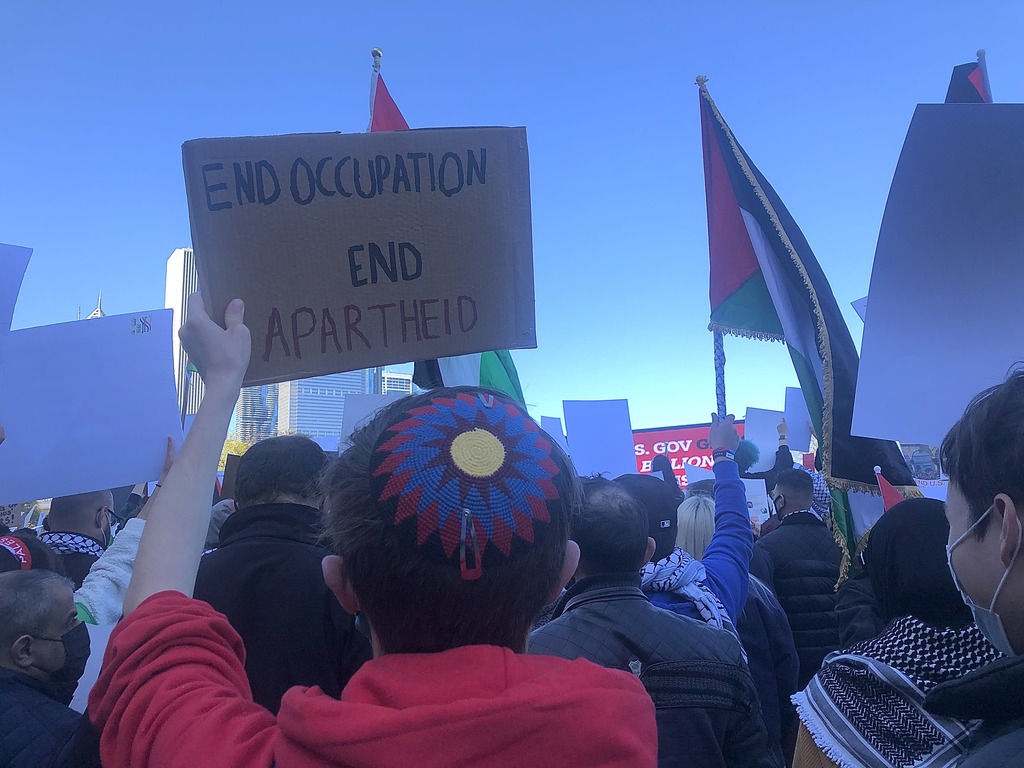Thousands marched in support of Palestine Wednesday afternoon amid rising violence in the Middle East.
It started as a rally in Grant Park and headed toward the Israeli Consulate, located at 500 W. Madison St. Along the way, the crowd of around 3,000 chanted for a “Free Palestine” and an end to U.S. aid to Israel.
The protest comes after a marked escalation in the Israel-Palestine conflict, with Israel conducting military strikes on Gaza, killing at least 84 Palestinans, including 17 children, since Monday, according to Gaza’s Hamas-run Health Ministry.
The protest was organized by the Chicago Coalition for Justice in Palestine, which consists of six different organizations: Students for Justice in Palestine (SJP) Chicago, the U.S. Palestinian Community Network, the Palestinian American Council, Al Nahda, American Muslims for Palestine (AMP) Chicago and the Palestinian American Community Center.
Many children and families attended this protest, with many bussed in from the suburbs of Bridgeview, Orland Park and Wheaton, as well as the Northwest side.
“I have four young children who totally don’t understand the conflict in Israel and Palestine, and I thought this would be a good opportunity for them to see the injustice going on back home,” said Felesteen Taweel.
Many of those protesting emphasized unity and solidarity.
“Don’t just sit there and say you stand for justice when it comes to a certain ethnic group or a certain background but not when it pertains to somebody else,” Taweel said
Adam Senalan said he felt obligated to protest and speak out against injustice, in part because of his Albanian roots.
“When we were out marching and rallying for Kosovo and for the people of Bosnia, we had our Palestinan brothers and sisters next to us, so now we in turn have to return the favor,” Senalan said.
Some protesters and organizers spoke of the difficulties it took to get to the protest, including hunger and other obligations because the protest took place on the last day of Ramadan — a month of fasting for many muslim Palestinians.
“All these folks have decided to come here and fight for Palestine, instead of prepping for Eid, in the middle of their fasting,” said Lara Haddadin, an organizer with the U.S. Palestinian Community Network.
“We’re here, but our hearts are in Palestine,” said protester Yasmin Mohammad. “Every time, we have to hope for better.”
Mohammad said she has a little more hope now than she did in 2014 during the Gaza War, partly because “everything is publicized” on social media in a way it hasn’t been before.
“How would you feel if someone was to knock on your door, and tell you that you had to leave, even though this is your home, where you’ve been living, and take it away from you,” Taweel said.
People felt the violence in Gaza not just in their hearts, but their checkbooks, saying that the U.S. financial involvement in Israel is another motivator.
“If we’re paying taxes, we have a duty to come out here and voice our opinions as to how those tax dollars are being spent and oppressing people of the world. Not just in Palestine, but everywhere,” Senelan said. “Today, it’s Palestine. Tomorrow it might be somewhere else.”
What’s happening in Israel/Palestine?
The Israeli military has launched hundreds of airstrikes since Monday, killing dozens and injuring nearly 500 in an escalation of a 74-year conflict. Despite international calls for de-escalation, Israeli Prime Minister Benjamin Netanyahu has continued to authorize aerial strikes and on-the-ground armed forces and tanks.
The escalations started over growing anger at the forced expulsion of Palestinian families from the occupied East Jerusalem neighborhood of Sheikh Jarrah.
Eight families are at imminent risk of expulsion, in order for Israeli settlers to take their place in accordance with a Jerusalem District Court ruling. These court rulings are part of an effort dating back to 1972 to evict the Palestinian families living in Sheikh Jarrah, with several settler organizations claiming the land originally belonged to them.
The U.S. has been involved in many parts of this conflict: Not only American donors have funded these settler organizations, but the U.S. military aid to Israel funds many of these strikes. The U.S. gives $3.3 billion annually in foreign military financing to the Israeli military.
The Israeli military reported that around 1,500 rockets had been fired to Israel, mostly by Hamas — a Palestinian Sunni-Islamic militant nationalist organization — killing seven.
Israel’s occupation of East Jerusalem is largely not recognized by the international community.
Audio package produced and edited by Damita Menezes.










